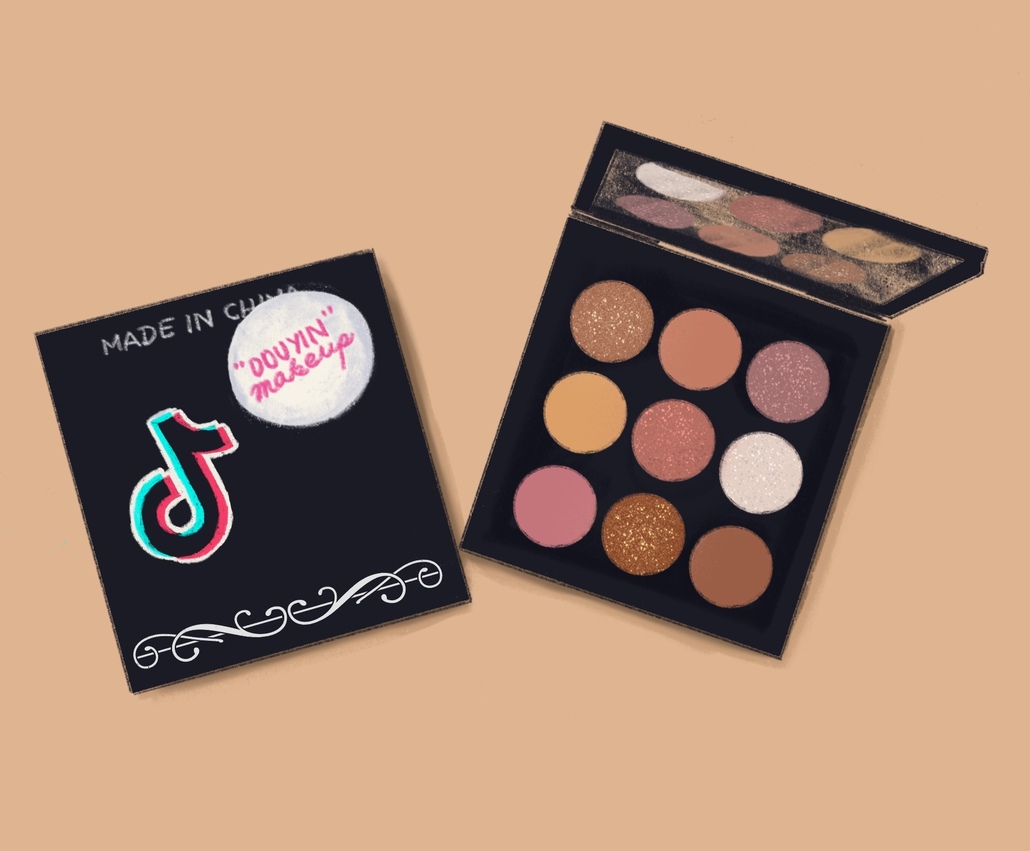With the popularization of K-pop, K-beauty, anime and J-beauty, more people have been gaining interest in East Asian culture. With an increase of beauty or fashion influencers creating content around style inspirations from East Asian trends, the miscategorization of Douyin videos, which are Chinese, as Korean or Japanese makeup looks is rooted in Sinophobia — or anti-Chinese sentiment.
According to Li Qin Tung, a web writer for Douyin Makeup, the style has become more popular due to its bold look that’s achievable with minimal effort. The makeup, she writes, “is characterized by bright colors, exaggerated eyeliner wings, dramatic eyeshadow looks and heavy contouring.”
Douyin makeup is the new it-girl look. Popular TikTok influencers are recreating the makeup looks using trendy K-beauty and J-beauty products. Korean makeup trends have similar attributes to Douyin, but are ultimately different. Qin Tung continues that while Douyin focuses on exaggerated eye looks, Korean makeup focuses more on looking natural and subtle.
Despite these differences, influencers and social media users misattribute Chinese trends and cultures to Korea and Japan, and the countries commodify their culture as a form of global influence. Proper attribution is especially important when spreading culture on social media because of its growing influence on global markets. It’s more than just makeup trends: it’s also about the impact of social media and pop culture on globalization.
The Carnegie Endowment for International Peace reports that the South Korea government is attempting to convert Korea’s pop culture into soft power by bringing celebrities to traditional diplomatic events and having them give speeches to support the country before any major negotiations.
On a macro level, these seemingly small trends and makeup looks have the potential to turn into cultural and international resources. Most importantly, though, these makeup looks are a personal form of storytelling that needs to be appropriately credited because they’re small building blocks to the foundation of cultural representation. While Hallyu and Japanese food and art are usually properly attributed and seen as trendy and stylish, China is met with misattributions and misinformation, which is rooted in Sinophobia.
China has always been negatively represented online: government criticism, anti-communist sentiment and a significant portion of the blame for the spread of coronavirus. The rest of its rich history and culture have been overlooked and brushed aside.
Douyin makeup is finally a positive form of representation because it builds a community for art and aesthetic self-expression, yet is often credited to China’s neighboring countries. Considering the history of imperial Japan’s impact on Chinese cultural erasure during the Second Sino-Japanese War, as well as cultural and territorial tensions between China, Japan and Korea, culture is also a form of soft power that has multiplying impacts on a global scale, as seen through Korea using Hallyu for diplomacy.
Chinese culture being credited to other countries makes it seem as though people don’t want to positively view China. Sinophobia makes it impossible for China to have representation outside the political sphere, and ignoring its origin gives the impression that only Japan or South Korea are worth exploring.
While most misattributions are probably honest mistakes and don’t have ill intentions of cultural erasure, the impact of disrespect and Sinophobia still exists: Some have called the misattribution out online as cultural erasure and degradation. With a constant anti-Chinese sentiment flooding in, properly educating and representing Chinese culture is crucial.
Fear of Chinese political and technological influence is seen in Montana’s ban on TikTok, a Chinese-owned app, and the fear-mongering that’s been taking place at American universities: the University of Texas at Austin among others recently banned TikTok on school devices and Wi-Fi. Generally categorized, those concerns are often rooted in racism.
While American apps like Instagram or Facebook — which sell users’ data and commonly disregard their privacy online — are still being used, TikTok has been banned for “security reasons.” Fashion and makeup trends are a form of self-expression and representation, and for them to be misattributed is disrespectful and microaggressive.
I’m not saying that every single influencer or video that misattributed Douyin as Korean or Japanese has a Sinophobic intent to downplay Chinese culture and its global influence — nor am I saying that misattribution directly leads to widespread impacts on an international scale. It is crucial, though, to research cultural trends, fashion and makeup before miscrediting and unintentionally spreading microaggressive forms of Sinophobia.
By continuing to discredit Douyin, we normalize small bouts of racism and Sinophobia that have snowballing impacts. As countries like the U.S. constantly spread anti-Chinese government sentiment, it’s our responsibility to inform ourselves about China outside politics and the American sphere to ensure we don’t spread more Sinophobic misinformation.
DONATION PLUG – PLEASE DO NOT TOUCH
Thank you for reading the Daily Trojan.
We are the only independent newspaper here at USC, run at every level by students. That means we aren’t tied down by any other interests but those of readers like you: the students, faculty, staff and South Central residents that together make up the USC community.
Independence is a double-edged sword: We have a unique lens into the University’s actions and policies, and can hold powerful figures accountable when others cannot. But that also means our budget is severely limited. We’re already spread thin as we compensate the writers, photographers, artists, designers and editors whose incredible work you see in our daily paper; as we work to revamp and expand our digital presence, we now have additional staff making podcasts, videos, webpages, our first ever magazine and social media content, who are at risk of being unable to receive the compensation they deserve.
We are therefore indebted to readers like you, who, by supporting us, help keep our paper daily (we are the only remaining college paper on the West Coast that prints every single weekday), independent, free and widely accessible.
Please consider supporting us. Even $1 goes a long way in supporting our work; if you are able, you can also support us with monthly, or even annual, donations. Thank you.










